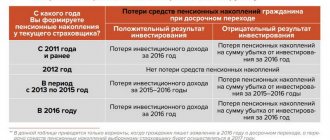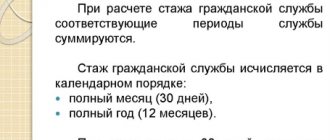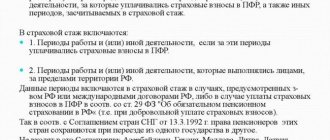- a) length of service, which gives the right to early assignment of a labor pension in old age, provided that on January 1, 2003 or at the time of assignment of a pension in 2002, the person applying for a pension has at least half of the required special experience;
b) length of service, which gives the right to early assignment of an old-age labor pension, regardless of the duration of the special work experience existing on January 1, 2003.
However, the Constitutional Court of the Russian Federation in its Determination indicated that these norms do not prevent the early assignment of an old-age labor pension, regardless of the period in which - before or after January 1, 2003 - work was performed under special working conditions [1].
Currently, such work experience includes the following types of work (Article 27 of the Law on Labor Pensions):
- 1) underground work, work with hazardous working conditions and in hot shops [2];
- 2) work under difficult working conditions;
- 3) for women - work as tractor drivers in agriculture and other sectors of the economy, as well as as drivers of construction, road and loading and unloading machines;
- 4) for women - work in the textile industry in jobs with increased intensity and severity;
- 5) work as working locomotive crews and workers of certain categories who directly organize transportation and ensure traffic safety on railway transport and the subway, as well as as truck drivers directly in the technological process in mines, open-pit mines, mines or ore quarries for export coal, shale, ore, rock;
- 6) work in expeditions, parties, detachments, on sites and in teams directly on field geological exploration, prospecting, topographic-geodetic, geophysical, hydrographic, hydrological, forest management and survey work;
- 7) work as workers, foremen (including senior ones) directly at logging and timber rafting sites, including servicing mechanisms and equipment;
 work as machine operators (docker-mechanizers) of complex teams during loading and unloading operations in ports;
work as machine operators (docker-mechanizers) of complex teams during loading and unloading operations in ports;- 9) work as a crew member on ships of the sea, river fleet and fishing industry fleet (with the exception of port ships constantly operating in the port water area, service and auxiliary and traveling ships, suburban and intracity traffic vessels);
- 10) work as drivers of buses, trolleybuses, trams on regular city passenger routes;
- 11) full-time work in underground and open-pit mining (including personnel of mine rescue units) in the extraction of coal, shale, ore and other minerals and in the construction of mines and mines;
- 12) work on vessels of the marine fleet of the fishing industry in the production, processing of fish and seafood, acceptance of finished products in the fishery (regardless of the nature of the work performed), as well as on certain types of vessels of the sea, river fleet and fishing industry fleet;
- 13) work as a civil aviation flight crew;
- 14) work on direct control of civil aviation flights;
- 15) work in the engineering and technical staff for direct maintenance of civil aviation aircraft;
- 16) work as rescuers in professional emergency rescue services, professional emergency rescue units of the Ministry of Emergency Situations of Russia) and those participating in the liquidation of emergency situations;
- 17) work with convicted persons as workers and employees of institutions executing criminal penalties in the form of imprisonment;
- 18) work in positions of the State Fire Service (fire protection, fire protection and emergency rescue services) of the Ministry of Emergency Situations of Russia;
- 19) persons who carried out teaching activities in institutions for children, regardless of their age;
- 20) persons who carried out medical and other activities to protect public health in health care institutions;
- 21) persons who carried out creative activities on stage in theaters or theatrical and entertainment organizations.
Lists of relevant jobs, industries, professions, positions, specialties and institutions (organizations), taking into account which an old-age labor pension is assigned, the rules for calculating periods of work (activity) and the assignment of said pension, if necessary, are approved by the Government of the Russian Federation.
The above conditions for assigning an old-age labor pension after the date of entry into force of the federal law on professional pension systems [3] apply if, on the day of entry into force of this law, the insured person has completed at least half of the length of service in the relevant types of work required for establishment of early labor pension in old age. If the specified conditions are met, the insured persons are provided with an old-age labor pension in accordance with the Law on Labor Pensions.
Persons who have worked in the relevant types of work for less than half the required period, as well as those hired to perform these works after the date of entry into force of the federal law on professional pension systems, are established with professional pensions regulated by the relevant federal law.
Separately, the Law on Labor Pensions distinguishes this type of special work experience, such as work in flight test crews
, directly in flight tests (research) of experimental and serial aviation, aerospace, aeronautical and parachute equipment. The list of relevant positions, taking into account which an old-age labor pension is assigned, the rules for calculating periods of work (activity) and the assignment of the specified pension, if necessary, are approved by the Government of the Russian Federation.
In this case, periods of military service in the positions of flight personnel and (or) periods of work in positions of civil aviation flight personnel are counted towards the length of service that gives the right to early assignment of an old-age labor pension, if the citizen has at least two-thirds of the flight test personnel the specified length of service falls on periods of work (activity) in positions that give the right to early assignment of an old-age labor pension.
Work experience in a certain area:
- 1) any work for a certain period of time in the Far North or equivalent areas;
- 2) work of persons permanently residing in the regions of the Far North and equivalent areas as reindeer herders, fishermen, and commercial hunters.
When assigning an old-age labor pension, taking into account such work experience, the list of regions of the Far North and equivalent localities is used, which was used when assigning state old-age pensions in connection with work in the Far North as of December 31, 2001 [4]
- 2. Special length of service allocated for socially significant circumstances (Article 28 of the Law on Labor Pensions):
- 1) women who have given birth to five or more children and raised them until they reach the age of eight; one of the parents of disabled people since childhood, who raised them until they reached the age of eight; guardians of disabled people from childhood or persons who were guardians of disabled people from childhood, raising them until they reached the age of eight;
- 2) women who have given birth to two or more children and have worked for a certain time in the Far North or equivalent areas;
- 3) disabled people due to military trauma;
- 4) visually impaired people with disability group I;
- 5) citizens suffering from pituitary papism (Lilliputians), and disproportionate dwarfs.
All these persons have the right to receive an old-age labor pension before reaching the generally established (60 years for men, 55 years for women) retirement age.
3. Civil service experience , which gives the right to a pension for long service in accordance with the Law on Pensions, is the total duration of periods of civil service and other activities taken into account when determining the right to a pension of federal civil servants and when calculating the amount of this pension ( Art.
2 of the Pension Law).
The period of service (work) in positions of the federal state civil service and other positions determined by the President of the Russian Federation is included in the length of service of the state civil service for the purpose of assigning a pension for length of service of federal state civil servants in the manner established by the Government of the Russian Federation [5].
4. Military length of service , which gives the right to pensions in accordance with the Military Pensions Law.
According to Art. 18 of this Law, the following periods are counted towards the length of service for granting a pension:
- • military service;
- • service in positions of ordinary and commanding personnel in internal affairs bodies, the State Fire Service; in the authorities for control over the circulation of narcotic drugs and psychotropic substances; service in institutions and bodies of the penal system;
- • service in Soviet partisan detachments and formations;
- • time of work in government and administrative bodies, civilian ministries, departments and organizations with retention in military service or in the personnel of the Ministry of Internal Affairs of Russia, authorities for control of the circulation of narcotic drugs and psychotropic substances, institutions and bodies of the penal system;
- • time of work in the system of the State Fire Service of the Ministry of Emergency Situations of Russia (fire protection of the Ministry of Internal Affairs of Russia, fire-fighting and emergency services of the Ministry of Internal Affairs of Russia, State Fire Service of the Ministry of Internal Affairs of Russia), immediately preceding their appointment to positions filled by ordinary and commanding personnel and military personnel of the State Fire Service ;
- • time spent in captivity, if the captivity was not voluntary and the serviceman, while in captivity, did not commit a crime against the Motherland;
- • the time of serving the sentence and detention of military personnel, privates and commanding officers who were unjustifiably brought to criminal liability or repressed and subsequently rehabilitated.
The length of service for assigning a pension to officers dismissed from service and persons in command of internal affairs bodies, the State Fire Service, bodies for control over the circulation of narcotic drugs and psychotropic substances may also include the time of their study before assignment to service (but not more than five years) from calculating one year of study for six months of service.
The time spent serving under special conditions is subject to counting towards the length of service for the purpose of granting a pension on a preferential basis.
The procedure for calculating length of service for assigning a pension is determined by the Government of the Russian Federation [6].
When calculating pension contributions, various factors are taken into account, including the citizen’s place of employment. Some persons working in specific conditions receive not ordinary labor service, but special insurance experience. This allows them to retire much earlier than expected.
What it is
The official definition of special length of service for assigning a pension is given in Art. 27 Federal Law “On Labor Pensions”.
It is accrued when working in hazardous conditions that negatively affect the health of the hired specialist. Additionally, this includes work with intense loads.
In order for a person to count on early retirement based on special service, certain conditions must be met.
These include:
- specific duration of work in difficult conditions;
- the presence of documents that confirm that the citizen worked under the right conditions.
A special feature of special experience is that it refers to periods of work under special conditions. This does not take into account how many insurance premiums were paid by the employer for the employee.
Formula and examples for calculating long service bonus
How length of service is paid is demonstrated in detail by the formula:
Long service bonus = “Bare” official salary * Bonus percentage of total service life +
Additional “seniority” payments * Approved district or regional coefficient
The peculiarity of calculating the bonus is to establish a percentage depending on the length of service in relation to the official salary without including additional bonus payments. An automatic increase in the indicator is a consequence of an increase in the established salary or the next passage of the “seniority barrier”.
The examples show how to calculate the long service bonus in specific situations:
- A secondary school teacher in the city of Bryansk with 15 years of experience is given a salary of 12,000 rubles. According to the terms of the collective agreement, the additional bonus payment for length of service is 5,000 rubles.
To calculate how much extra is paid for the duration of work as a whole, it is necessary to take into account the percentage of the premium from the tabular data (30%) and the absence of an increasing coefficient for the territory. The initial data is substituted into the formula:
Experience bonus = 12,000 * 0.3 + 5,000 = 8,600 rubles.
- A colonel with 26 years of experience serving in the city of Norilsk is given a salary of 30,000 rubles and an additional payment for length of service of 15,000 rubles.
The total amount of the surcharge is calculated in a similar way, taking into account the regional coefficient of Norilsk - 1.8 and a maximum surcharge of 40%.
Experience bonus = (30,000 * 0.4 + 15,000) * 1.8 = 48,600 rubles.
When calculating payments for length of service, the established official salary plays a decisive role, then the total length of service and the regional coefficient. The additional payments, bonuses and remunerations provided for in internal documents in addition to the salary, regardless of merit, do not have an impact on the total amount of the allowance, which is reflected arithmetically by the above formula.
Length of service is an indicator characterized not only by the total length of service, but also by the impeccability of service. In addition to state guarantees, it is possible to introduce additional incentive and compensation payments by internal documents. The only requirement of the Labor Code is an improvement in financial situation compared to the conditions guaranteed by state support.
What is a bonus for length of service at a company?
An additional payment for length of service is a special incentive payment that increases the salary of certain categories of employees. Legislatively, such an allowance is provided for:
- for public sector employees and civil servants;
- police officers;
- military personnel and some other categories of workers.
At the legislative level, the issue of additional incentives for employees for length of service is established, for example:
- Law “On social guarantees for employees of the Department of Internal Affairs of the Russian Federation” dated July 19, 2011 No. 247-FZ (Articles 7, 8);
- Law “On the State Civil Service of the Russian Federation” dated July 27, 2004 No. 79-FZ (clause 2 of Article 54);
- by order of the Minister of Defense of December 30, 2011 No. 2700;
- Decree of the Government of the Russian Federation “On the procedure and conditions of payment” dated 07/08/1993 No. 638.
In addition, the procedure and conditions for receiving additional payments for continuous work experience may be determined by the local documentation of enterprises.
According to the above-mentioned regulations and other legislative documents on the same topic, the amount of additional payments for length of service is determined as a percentage of the salary, taking into account the duration of work. The amount of payments of this kind is, as a rule, 5–40% (for some specialists and more) of the salary portion of the remuneration.
How is the long-service bonus calculated for civil servants and public sector employees?
The amount of the bonus for work experience as a civil servant is determined by clause 5 of Art. 50 of the Law “On State Civil Service” dated July 27, 2004 No. 73-FZ and amounts to:
- with experience from 1 to 5 years - 10% of salary;
- from 5 to 10 years - 15%;
- from 10 to 15 years - 20%;
- from 15 years - 30%.
At the same time, to calculate the length of service in state civil positions, in accordance with paragraph 1 of Art. 54 of Law No. 73-FZ, work in the following positions is counted:
- civil service, military and federal civil service;
- state (in accordance with the decree of the President of the Russian Federation of December 31, 1995 No. 32);
- municipal;
- others, if this is enshrined in federal legislation.
In addition, according to paragraph 2 of Art. 54 of Law No. 73-FZ, for the purpose of establishing additional pay for civil servants for the duration of work, in addition to the cases specified in paragraph 1 of the article, the periods of filling positions listed in Decree of the President of the Russian Federation of November 19, 2007 No. 1532 are counted.
The procedure for establishing and paying additional amounts in connection with the duration of employment is also determined by Decree of the President of the Russian Federation No. 1532, taking into account the explanations given by the Federal Tax Service in letter dated July 26, 2011 No. 4-3-22 / [email protected]
As for state employees in general, this is a large group of workers, many of whom are entitled to additional payments for the duration of their work. The specific conditions for the appointment of such payments and their amounts are established by legislative acts regulating the work of a particular department. For example, the Decree of the Government of the Russian Federation “On the procedure for calculating length of service” dated January 23, 2003 No. 43 establishes provisions on additional. payment for length of service to employees of the penal system, customs, fire service and tax police.
How to calculate the bonus for length of service in the Ministry of Internal Affairs
The amounts of additional payment for the duration of service for employees of internal affairs bodies are determined by clause 7 of Art. 2 of Law No. 247-FZ and are:
- with experience from 2 to 5 years - 10% of the salary;
- from 5 to 10 years - 15%;
- from 10 to 15 years - 20%;
- from 15 to 20 years - 25%;
- from 20 to 25 years - 30%;
- over 25 years - 40%.
The length of service for calculating the specified additional payment is calculated according to the norms of the Decree of the Government of the Russian Federation “On the procedure for calculating length of service (length of service) for the payment of a monthly bonus to the monthly salary for length of service (length of service) to employees of the Department of Internal Affairs of the Russian Federation” dated December 27, 2011 No. 1158. According to Clause 2 of the rules approved by this resolution, work in various positions is included in the length of service:
- service activities in the national troops. guard, militia, police, police department;
- probationary period (internship) for relevant positions in the internal affairs department;
- service in the tax police, etc.
In addition, the document sets out the specifics of calculating length of service for police officers at the time of the Republic of Crimea’s admission to the Russian Federation.
What is the amount of additional payment for military service?
Additional payments for length of service to military personnel are established by the Law “On Monetary Allowances for Military Personnel” dated November 7, 2011 No. 306-FZ and by Order of the Minister of Defense dated December 30, 2011 No. 2700. The amount of these payments is determined by Part 13 of Art. 2 of Law No. 306-FZ and paragraph 40 of Order No. 2700.
The monthly bonus for length of service for contract military personnel is:
- with 2–5 years of service - 10% of salary;
- 5–10 years - 15%;
- 10–15 years - 20%;
- 15–20 years - 25%;
- 20–25 years - 30%;
- more than 25 years - 40%.
The bonus is paid from the moment the serviceman reaches length of service, which allows him to receive an additional payment to his salary, until the day of dismissal from military service (the date of issuance of the order to be removed from the lists of personnel).
Calculation of periods of service giving the right to additional payment for length of service is made in accordance with the norms of the law “On military duty and military service” dated March 28, 1998 No. 53-FZ and the rules approved by the Decree of the Government of the Russian Federation “On the procedure for calculating length of service for the appointment of military personnel undergoing military service under a contract, monthly allowances for length of service" dated December 21, 2011 No. 1074. Clause 2 of the above rules defines a list of periods counted toward length of service that gives rights to additional benefits. payment. This list consists of 19 items describing various options for filling positions in the military service. In addition, the rules determine the procedure for enrolling periods of service on preferential terms (clauses 3–9).
Allowances in the Far North
A number of bonuses are guaranteed to workers in the Far North. Today, there are two main categories: 1. Depending on the area in which the person works
. At the beginning of his or her work experience, the employee is given a minimum bonus of 10%. Every six months it increases by another 10% and stops growing, reaching the maximum established for a given area (there are only 4):
- 100% – Chukotka Autonomous Okrug, Kamchatka, islands of the Arctic Ocean;
- 80% - some areas of the Khabarovsk Territory, the Sakha Republic, the northern regions of the Komi Republic;
- 50% – Amur, Arkhangelsk and Sakhalin regions, the Republics of Karelia and Buryatia, Primorsky Territory;
- 50% – Irkutsk region, Komi Republic, southern regions of the Far East.
2. Depending on how old the person is
. Employees under 30 years of age have the right to an accelerated procedure for calculating bonuses. If they work in areas of the first and second groups, then they are entitled to an initial bonus of 20%. The size of the premium increases with the same frequency of 6 months, but by 20% until it reaches the maximum level.
Rules for calculating years worked
To determine the duration of special service, the total number of days of production is calculated. To receive an early pension, you must work in the Far North or under dangerous conditions.
If a woman works under such conditions and is pregnant, she is transferred to safe work, but the entire period is counted as special work experience.
In order to correctly perform the calculation, special lists approved by the Government of the Russian Federation, as well as those available in the provisions of Federal Law No. 400, are taken into account.
During the calculation, the following rules are taken into account:
- the retirement age is reduced for a period of 5 to 10 years;
- usually more favorable conditions are offered for women;
- for some positions, special rules are provided for the influence of special experience on reducing the retirement age;
- to confirm the harmfulness of work, it is necessary to focus on the results of a special assessment, which is carried out annually after 2012;
- Work that is carried out in the Far North or other areas equated to northern conditions has a huge impact on the length of service.
Before the adoption of Federal Law No. 400 in 2013, slightly different rules for calculating special service were applied, which are still used in determining the current retirement age.
Who is entitled to additional payments for continuous experience and length of service?
Russian laws directly require the accrual of a special additional payment for long and continuous work experience to certain categories of specialists.
Typically, such additional payments motivate to work in a particular specialty or in a particular field of activity for a long time without breaks in the length of service (valid reasons for a break do not count - maternity leave and other similar situations when a person retains his job , do not count). Such an additional payment, for example, should be applied to the salaries of school teachers and some other employees of the education system, to the salaries of some medical specialists, etc.
In addition, employees in law enforcement agencies: armed forces, police, etc. receive an increase for length of service with continuous service.
A similar increase is given to certain civil servants who are considered public sector employees.
Finally, a similar additional payment for continuous work experience is due to those who work in the Far North or regions that are equivalent to it. All such regions are listed in the law; in total, there are four groups of such regions, depending on the severity of the climate in them. The maximum additional payment in these regions can range from 30 to 100 percent of earnings.
In the conditions of the Far North, an additional payment for length of service is accrued on all earnings, taking into account all bonuses and other payments. This distinguishes this category from all others. For doctors, teachers, security officials or civil servants, the additional payment is calculated only from their salary.
When a pension is assigned based on special service
Federal Law No. 400 lists the main types of activities for which special experience is accrued.
These include work:
- in hot shops;
- underground;
- in difficult conditions;
- in logging or timber rafting;
- on long-distance vessels;
- on trucks or railways;
- in fire services, etc.
The following periods are included in the special period:
- temporary disability;
- maternity leave;
- downtime due to the fault of the employer.
If a person worked in rural and urban conditions, then a mixed work experience is formed. If the work is carried out in a village, then for 1 year of work an experience of 1 year and 3 months is accrued. For medical employees, a special correction factor is applied during calculation.
Expert opinion
Kuzmin Sergey Yaroslavovich
Lawyer with 8 years of experience. Specializes in the field of civil law. Legal expert.
For example, for surgeons, traumatologists and ophthalmologists working in surgical departments, one year is equivalent to 1 year and 6 months. The same conditions are offered to persons working in intensive care units.
When calculating the length of service of medical employees, the provisions of numerous regulations are taken into account, which can be not only federal, but also regional.
General terms
On a general basis, special experience is accrued if a citizen works in a specific profession or position that is included in the list of Federal Law No. 400. At the same time, certain requirements are presented to each specialist, which must be confirmed by official documents.
Work in the North
People who choose to work in the northern regions of the Russian Federation work under difficult conditions, so they can count on different preferences from the state. These include the early one.
Since 2008, the number of regions and cities that are considered equivalent to the Far North has increased . If a person worked in these entities before 2008, then the experience gained will not be considered special, and after 2008 new calculation rules apply.
The latest adjustments were made by regulations of 2012, so before starting the calculation it is recommended to study the current data.
By length of service
Thanks to special experience, citizens have the right to take advantage of their length of service in order to retire earlier than expected. In this case, it is not the person’s age that is taken into account, but the required number of years of experience.
This provision is important for the military, since during their service no funds are transferred to the Pension Fund for them, but their length of service is taken into account to calculate their future pension, and a length of service benefit is also offered. Not only military personnel, but also civil servants, miners or persons whose work is equivalent to military activity can count on such concessions.
It is required to obtain at least 25 years of experience, and for civil servants at the federal level, this period is reduced to 15 years. Local regulations apply correction factors during calculations.
Other situations
Sometimes the length of service includes not only periods of direct work, when the employer transferred funds to the Pension Fund for a person, but also other periods. These include obtaining education in the field of medicine or pedagogy. Additionally, this includes the period of military service.
Calculation of a serviceman's length of service
The pension amount is 50% of the salary for 20 years of service and 3% for each year of service beyond 20, but not more than 85%. Total in the case under consideration, the payment amount will be 50% + (36 – 20) * 3% = 98%. Since the limit is set, the pension will be 85% of the salary.
- in the Armed Forces of the Russian Federation, internal troops of the Ministry of Internal Affairs of Russia, civil defense troops, engineering, technical and road-building military formations under federal executive authorities, the Foreign Intelligence Service of the Russian Federation, the FSB of Russia, federal state security agencies, the federal agency for ensuring mobilization training of government bodies RF;
- in the Armed Forces, troops and bodies of the KGB of the USSR, the Central Intelligence Service of the USSR, the Security Directorate under the Office of the President of the USSR, the Committee for the Protection of the State Border of the USSR, the federal security bodies of the RSFSR, the Foreign Intelligence Service of the RSFSR, the Inter-Republican Security Service, the Security Service of the President of the Russian Federation, federal bodies state security, counterintelligence agencies of the Russian Federation, border troops, bodies of the Federal Border Guard Service of Russia, the State Fire Service of the Ministry of Internal Affairs of Russia, the Railway Troops of the Russian Federation, troops of the Federal Agency for Government Communications under the President of the Russian Federation, federal agencies of government communications and information, the Special Communications and Information Service under the Federal Security Service of Russia, the Main security department of the Russian Federation, in the internal and railway troops, other military formations of the USSR, in the United Armed Forces of the CIS member states;
- citizens of the Russian Federation in the armed forces, other troops, military formations and bodies of the CIS member states (when they are transferred in the prescribed manner to the Armed Forces of the Russian Federation, other troops, military formations and bodies);
- citizens of the Russian Federation before January 1, 1995 in the Armed Forces, other troops, military formations and bodies of states - former republics of the USSR, not members of the CIS;
- citizens of the Russian Federation in the armed forces, other troops, military formations and bodies of foreign states with which relevant international treaties or agreements on military cooperation have been concluded;
- Detention in custody, serving a sentence in places of deprivation of liberty and being in exile - in the event of an acquittal or termination of a criminal case, unjustified prosecution and repression;
- A break in service in the event of unjustified dismissal and subsequent reinstatement in service in accordance with the established procedure;
- work in the system of the State Fire Service of the Ministry of Internal Affairs of Russia, the State Fire Service of the Ministry of Emergency Situations of Russia, immediately preceding appointment to positions filled by ordinary or commanding personnel and military personnel of the State Fire Service of the Ministry of Internal Affairs of Russia and the Ministry of Emergency Situations of Russia;
- in internal affairs bodies, police, correctional labor institutions, paramilitary fire brigade, other institutions and formations of internal affairs bodies (public order protection) of the Russian Federation and the USSR as private and commanding officers;
- in institutions and bodies of the penal system;
- suspension of military service of military personnel elected as deputies of the State Duma of the Federal Assembly of the Russian Federation, deputies of legislative (representative) bodies of the constituent entities of the Russian Federation, heads of executive bodies of state power of the constituent entities of the Russian Federation, deputies of representative bodies of local self-government and heads of municipalities and exercising these powers on a permanent basis, as well as military personnel, exercising powers of members of the Federation Council of the Federal Assembly of the Russian Federation;
- being in captivity or as hostages, as well as internment in neutral countries - until the circumstances of being captured as hostages, internment or release are fully clarified;
- unknown absence - until recognized as missing in the manner prescribed by law or declared dead.
We recommend reading: Electric train benefits for pensioners in St. Petersburg for 2021
When to apply
It is impossible to say exactly when a person will be able to apply for a pension, since he can start working under difficult conditions at different ages. In this case, lists of professions are taken into account, which are regularly changed and supplemented by federal regulations.
Therefore, the following rules are taken into account:
- if a woman worked under particularly difficult and dangerous conditions, then she will be able to retire at the age of 45, but this requires at least 15 years of experience, and of these 15 years, at least 7.5 must be worked in hazardous production;
- if a man works under such conditions, then retirement is possible for him from the age of 50 with 20 years of experience, with 10 years of special experience required;
- if the work is carried out in simply dangerous conditions, then women retire at 50 years old with 20 years of experience, and men at 55 years old, and their experience should be 25 years.
The full list of professions and conditions can be studied on the website of the Government of the Russian Federation, and changes and additions are regularly made.
Each profession has its own nuances. For example, medical workers who work in villages can count on a pension payment from the state 25 years after employment.
If the work is carried out in the city, then 30 years of experience is required. At the same time, special coefficients are offered for surgeons and some other doctors.
If a teacher applies for early retirement, then not only work in the profession is taken into account, but also postgraduate studies, as well as occupation of other positions in the educational field.
How are long-service benefits calculated?
To correctly calculate such payments, not only the employee’s position is taken into account, but also the salary that he received during his working life.
The calculation of a civil servant's long-service pension in 2021 is based on formulas, which include:
- total period of time worked;
- average income per month (it is calculated based on the information specified in the income certificate for the last year);
- increasing or decreasing coefficient;
- allowances and increases;
- indexation (these changes in charges occur in accordance with inflation);
- deductions from pension payments.
For each profession that allows you to retire based on length of service, special formulas are used, and the funds due are calculated using them.
Documents for confirmation
When applying for an early pension, it is necessary to prepare evidence of special experience.
for this :
- a work book designed to record all places of employment of a citizen;
- salary transfer invoices, which can be replaced by pay slips;
- labor agreements drawn up and signed with employers;
- extracts made from orders of the leadership of various organizations;
- certificates from institutions that contain information about the terms of work, position held and other relevant data.
The need to obtain certificates and other documents arises if PF employees, for various reasons, do not have information about all places of employment of a citizen applying for early retirement. Therefore, if a citizen is previously denied a payment, he will have to collect the necessary documentation within 5 days.
If the organizations in which the citizen worked are already closed, then you will have to use the services of the archive. The certificates must contain information not only about the periods of work and the name of the organization, but also about the position held, as well as about the dangerous or difficult conditions under which labor duties were performed.
These documents confirm that the work was indeed dangerous and difficult. Job descriptions and employment agreements may be used for this purpose.
If the company where the citizen worked was not an official enterprise with special conditions, then such length of service is not considered special. In this case, even the testimony of other workers is not taken into account.
What is special work experience, its types
The dry formulation of special work experience (STS) states that this is a certain period of time during the entire working life of a citizen, which applies to work in special social conditions or to the implementation of one’s professional skills in special working conditions. It is taken into account primarily when calculating pension benefits, namely: for early termination of work or receiving increased payments based on its results.
As a rule, STS is a period of work under conditions that can be called:
- heavy;
- harmful;
- dangerous.
In addition, STS is assigned based on the performance of duties while in certain positions. It is often equated with professional length of service, which is assigned to citizens employed in:
- pedagogical field;
- healthcare system;
- civil aviation;
- government agencies;
- Armed Forces, as well as persons in military service (this includes internal organs);
- the field of art.
Of course, the wording is quite vague, but at the moment it is not fixed by law. It was first adopted on November 20, 1990 in the Law of the Russian Federation, which has lost its force, namely: “On state pensions in the Russian Federation.”
The STS also provides for a special regime for calculating pensions for citizens, regardless of the interruption/duration of employment or conducting socially useful activities:
- in climatic zones with difficult weather conditions, in particular the Far North;
- in areas of radioactive contamination;
- in underground or hot work.
Is 2.5 years of military department of the institute counted in the calendar length of service?
Hello, do I have the right to a military pension and does studying at a civilian institute, namely 2.5 years of the military department (6 years of total study at the institute) count towards my length of service? The length of service is currently 17 calendar years and 6 months, in preferential terms 25 years and 6 months. From the very beginning, after graduating from college, he served in areas (17.6), where 1 year of service is considered 1.5 in preferential calculations for an officer. If 17.5 calendars plus 2.5 military departments will be 20 calendar years or not. Answer please. And am I currently entitled to an apartment or a one-time monetary compensation for it? And is it possible for me to submit documents at the moment to RUZHO to provide me with housing (or rather, monetary compensation). That is, the essence of the question is, do I have 20 calendar years or not, does it count towards my studies at the moment, or do I still need to serve another 2.5 years to have 20 calendar years (does the military department count or not)? And am I entitled to monetary compensation for an apartment now (can I submit documents to RUZHO) if I’m 20 years old?
We recommend reading: Living space in a dormitory is normal
2. Count into length of service for the purpose of pensions in accordance with paragraph “a” of Article 13 of the Law of the Russian Federation “On pension provision for persons who served in military service, service in internal affairs bodies, the State Fire Service, bodies for control of the circulation of narcotic drugs and psychotropic substances” substances, institutions and bodies of the penal system, and their families" (hereinafter referred to as the Law) to officers assigned to military service from the reserve, taking into account the specialty acquired in a civilian educational institution, as well as female officers assigned to military service under the specified condition, for those who were not in the reserve, their training time before being assigned to military service in civilian higher educational institutions or in secondary specialized educational institutions that had cycles or military training departments was up to five years at the rate of one year of study per six months. Under the same conditions, the length of service includes the time spent studying in civilian higher educational institutions for officers who, as students, are enrolled directly from these educational institutions before their graduation to continue their studies at higher military educational institutions.
Legislative framework regulating issues related to STS
A single legal act that unites all the norms regulating labor relations is the Labor Code of the Russian Federation. It was accepted on December 21, 2001, but it does not contain the concept of special work experience, although there are occasional references to special working conditions.
Special working conditions are separately stipulated in government decree No. 665. It was adopted on July 16, 2014; the text lists in detail all the lists of jobs, positions, professional activities and existing industries that can be classified as harmful, dangerous, and difficult.
Expert opinion
Kuzmin Sergey Yaroslavovich
Lawyer with 8 years of experience. Specializes in the field of civil law. Legal expert.
In addition, there are many federal laws of the Russian Federation with all the amendments and changes that regulate employment, benefits and features of the subsequent calculation of pensions for different categories of citizens. In particular:
- No. 400-FZ (1.01.15), which determines, among other things, the calculation of insurance pensions;
- No. 173-FZ (12/17/01), adopted to determine different types of activities when calculating seniority;
- No. 166-FZ (12/15/01), which generally regulates pension provision;
- No. 10-FZ (12.01.96), respectively - trade unions;
- No. 3061-I (06.18.92) - for all categories of citizens who experienced the consequences of the Chernobyl explosion;
- No. 384 (5.07.91) - for aviation services employees.
The lists of positions, specialties, special works and industries that are declared in the 29th resolution of the Ministry of Labor of the Russian Federation (05.22.96) are still relevant. True, they are now recorded in government decree No. 781 (10.29.02) and No. 516 (07.11.02). They are used when assigning long-service pensions, early retirement, and also when determining special working conditions. They approve the possibility of early termination of work and retirement. Read more about the minimum length of service here.
Features of calculating length of service for additional payment
The length of service for granting a long service bonus is calculated on the basis of the work book or special statements and orders that reflect the person’s length of service in this specific position. The presence of length of service is determined by the personnel service, which, upon reaching the length of service specified in the regulatory documents, issues an appropriate order for the accounting department.
When calculating length of service for additional payment, time at the main place of work is taken into account, while length of service gained while working part-time is not taken into account.
It is worth remembering that for some categories of military personnel, length of service is considered somewhat differently - a month of work can be taken as either one and a half or two months of service. For example, a month of work is counted as two for aviation workers whose tasks include testing catapults and conducting research related to parachute jumping. If a person is engaged in parachute jumping and is part of the crew of combat ships or is a participant in oceanographic expeditions, then the month of his work is equal to 1.5 in calculations. In addition, the length of service that gives the right to payment includes not only the time when the person actually worked, but also the following periods:
- maternity leave>;
According to a medical report, the period of child care can be up to 6 years. If he has stage 1 diabetes mellitus and is insulin dependent, the period increases to 16 years. - when a person did not actually work, but a place was reserved for him. Some nuances of accounting for experience are also available for social workers. They take into account the time spent working in state and municipal institutions and organizations, regardless of the type of subordination. There is only one condition - salary calculations must be carried out in accordance with the terms of payment for the corresponding category of employees.
 work as machine operators (docker-mechanizers) of complex teams during loading and unloading operations in ports;
work as machine operators (docker-mechanizers) of complex teams during loading and unloading operations in ports;








